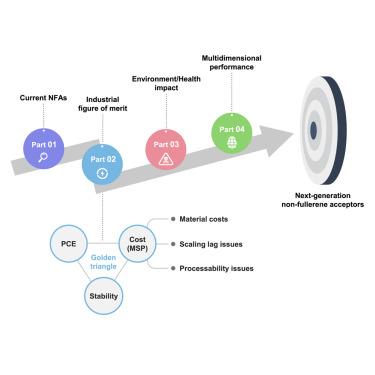基于非富勒烯受体的有机光伏材料的见解和挑战
IF 35.4
1区 材料科学
Q1 CHEMISTRY, PHYSICAL
引用次数: 0
摘要
有机光伏(opv)在器件效率和运行稳定性方面取得了重大进展,单结电池的效率超过20%,寿命超过10,000小时。这些改进主要是由新型非富勒烯受体(nfa)及其相应的供体材料的快速发展所推动的。虽然相关的有源层材料是高效和稳定的,但它们的发展很大程度上依赖于经验的试错方法和对性能指标的执着追求,对控制器件性能的复杂结构-性能关系、合适的供体/受体(D/ a)组合和元件调制的理解有限。为了弥合性能改进和器件实用性之间的差距,本文研究并描述了新兴的非富勒烯OPV系统的几个重要概念方面,这些方面为材料设计和D/A兼容性提供了基本见解,并进一步概述了NFA开发中涉及的关键挑战,以及一些有用的材料设计指南。展望未来,我们将讨论NFA材料方面的一些研究方向,以进一步提高器件协同性能。本文章由计算机程序翻译,如有差异,请以英文原文为准。

Material insights and challenges for organic photovoltaics based on non-fullerene acceptors
Organic photovoltaics (OPVs) have witnessed significant advancements in device efficiency and operational stability, with single-junction cells exceeding 20% efficiency and over 10,000 h of lifetime. These improvements have been primarily driven by the rapid development of novel non-fullerene acceptors (NFAs) and their corresponding donor materials. Although relevant active layer materials are highly efficient and stable, their development largely relied on empirical trial-and-error approaches and the obsessive pursuit of performance metrics, with a limited understanding of the intricate structure-property relationships governing device performance, the suitable donor/acceptor (D/A) combinations, and component modulation. To bridge the gap between performance improvement and device practicality, this review examines and describes several important conceptual aspects of the emerging non-fullerene OPV systems that have provided fundamental insights into material design and D/A compatibility and further outlines the key challenges involved in NFA development and some perspectives along with useful material design guidelines. Looking forward, we will discuss some research directions in terms of NFA materials for further improving device collaboration performance.
求助全文
通过发布文献求助,成功后即可免费获取论文全文。
去求助
来源期刊

Joule
Energy-General Energy
CiteScore
53.10
自引率
2.00%
发文量
198
期刊介绍:
Joule is a sister journal to Cell that focuses on research, analysis, and ideas related to sustainable energy. It aims to address the global challenge of the need for more sustainable energy solutions. Joule is a forward-looking journal that bridges disciplines and scales of energy research. It connects researchers and analysts working on scientific, technical, economic, policy, and social challenges related to sustainable energy. The journal covers a wide range of energy research, from fundamental laboratory studies on energy conversion and storage to global-level analysis. Joule aims to highlight and amplify the implications, challenges, and opportunities of novel energy research for different groups in the field.
 求助内容:
求助内容: 应助结果提醒方式:
应助结果提醒方式:


